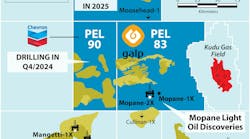Rocky Mountain oil and gas producers completed their ‘Washington Call-Up’ annual visit to Washington generally satisfied that meetings with members of the 110th Congress and their staffs went well, officials of the Independent Petroleum Association of Mountain States said.
About 35-40 IPAMS members participated in 130 meetings, primarily with new US House and Senate members. Most calls were to members from outside the Rockies who might not have been acquainted with issues oil and gas producers confront in the region, IPAMS Executive Director Marc W. Smith said.
“They seemed very interested in what we had to say. Most often, their response was ‘I didn’t know that,’” he told OGJ as the 2007 organized call-up concluded on Mar. 29.
Several meetings were with House Democrats who are part of the Blue Dog Coalition. “They’re particularly important. They’re from politically centrist districts and can provide a moderating influence,” Smith explained.
IPAMS members came to Washington this year to ask Congress and the Bush administration to not inadvertently harm domestic independent producers with punitive legislation directed at multinational oil companies and the Organization of Petroleum Exporting Countries.
Smith warned that new legislation which increases regulatory and tax burdens for domestic producers could significantly affect smaller independents.
“Vengeful policies may actually be most harmful to the small, independent businesses that produce 82% of US natural gas and 68% of US oil. These independent producers are a driving force behind our domestic energy supply and should not fall victim to the misdirected wrath of Congress,” Smith said.
“These burdens decrease the amount of investment in energy projects, thereby impacting local economic benefits that are a direct result of energy development. The American energy industry needs a stable and predictable regulatory environment in order to continue meeting American energy demands,” he maintained.
“Put simply, we’re not asking Washington for any special treatment. We are urging Congress to move with caution and thoroughly consider the implications of policies that might hurt the domestic oil and gas industry,” Smith said.
‘Interesting alignment’
The call-up coincided with a Mar. 27 House Natural Resources Committee on possible effects of oil and gas exploration and development on continued access to hunting and fishing areas on public lands in the Rockies. Officials from two labor unions joined representatives of wildlife preservation groups in saying hunting and fishing access and quality are endangered. “It was an interesting alignment,” IPAMS Pres. Logan Magruder observed.
Andrew Bremner, IPAMS’ government affairs director, pointed out that the oil and gas industry is one of the largest employers in the Rockies, accounting for more than 77,000 jobs with an average annual salary of $51,022.
“Our industry provides billions of dollars in taxes and royalties that provide quality schools, equipment and personnel for law enforcement, and maintenance for roads and highways throughout the West,” he said.
The producers shared their passion for outdoor recreation with the union members, said Magruder, who also is president and chief operating officer of Quantum Resources Management LLC in Denver.
IPAMS pointed out in a letter to Resources Committee Chairman Nick Rahall (D-W.Va.) and Chief Minority Member Don Young (R-Alas.) that the oil and gas association historically has worked with conservation and sporting groups to preserve wildlife habitat.
The group also highlighted its participation in the Conservation in Action program in one of three newspaper advertisements that ran during the call-up. The other ads profiled independent producers that drill 90% of total US wells as “small businesses fueling America” and described natural gas as “the bridge to our renewable energy future.”
